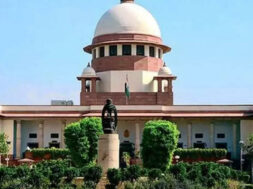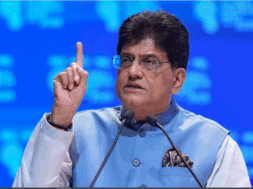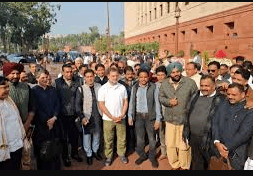
Chandigarh Mayoral Poll: SC Takes Dim View of Presiding Officer’s Action Invalidating Opposition Votes
Manas Dasgupta
NEW DELHI, Feb 5: Calling it a “murder of democracy” from what is seen from a viral video of the presiding officer himself defacing some ballot papers to enable the BJP win the Chandigarh mayoral elections, the Supreme Court on Monday ordered the Registrar General of the Punjab and Haryana High Court to secure all the records pertaining to the polling on January 30 and also directed deferring the first sitting of the new body till the court cleared the matter.
Incensed by the video, an angry chief justice of India DY Chandrachud commented that the presiding officer, Anil Masih, a member of the BJP’s Minority Cell, should be prosecuted for openly murdering democracy.
The video of Presiding Officer appearing to write on the ballot papers of some Aam Aadmi Party (AAP) councillors’ before he entered them into the record – was widely shared on social media, drawing severe criticism from the AAP and its allies. By writing on the councillors’ ballot papers, AAP had argued, Mr Masih deliberately invalidated their votes in an election the party was widely expected to win comfortably, and handed the BJP a victory.
“It is obvious he defaced the ballot papers. It is clearly visible in the video… he is looking into the camera and spoiling the ballot paper… Is this the way he conducts the elections? This is a mockery of democracy. This is a murder of democracy. This man should be prosecuted,” the court said.
The polling for the January 30 elections to the Chandigarh Municipal Corporation provided shocking results as the BJP which had only 15 votes, including the vote of the Chandigarh Member of the Lok Sabha Kirron Kher, who is ex-officio member of the civic body, managed to win the elections in the 36-member House defeating the AAP-Congress joint candidate who had the support of 20 councillors. While the BJP nominee Manoj Sonkar polled 16 votes, the AAP-Congress candidate secured only 12 with eight AAP votes declared invalid by the presiding officer without assigning any reason. The BJP has 14 councillors in the 35-member corporation, AAP 13 and the Congress, seven.
The mayor elections controversy came under the lens of the Supreme Court, which declared that it would not allow the “murder of democracy” and ordered the Registrar General to secure all the records by 5 pm on Monday. The court will hear the case next on February 12.
Delhi chief minister Arvind Kejriwal’s AAP accused the Presiding Officer of rigging the election and demanded that he be arrested for “tampering” with ballot papers. Eight votes were declared invalid, which turned the election in favour of the BJP despite the numbers favouring the AAP Congress alliance.
AAP has held mega protests in Delhi and Chandigarh over the issue and went to court, contending that the Returning Officer, Anil Masih, was caught on camera smudging the ballot papers. The AAP MP Raghav Chadha claimed that all eight votes declared “invalid” by Mr Masih had been for his party candidate. Had those votes counted, the AAP would have won. The Congress alleged that the BJP workers tore up the ballot papers and their agent was not allowed to see them.
CJI Chandrachud said what the Returning Officer did “was like the murder of democracy”. “It is clearly visible in the video that he is looking into the camera and spoiling the ballot paper… Legal action should be taken against this officer.” The three-judge bench of Chief Justice Chandrachud, Justice JB Pardiwala and Justice Manoj Mishra, has also put a freeze on the budget session of the Chandigarh civic body, which was expected to be presented on Tuesday. The budget cannot be presented till further orders, the judges said.
In its petition, AAP had alleged that the elections were not conducted in a free and fair manner. Ballot papers were tampered with and results were declared in favour of BJP. The
AAP has called for cancelling the election, sealing the records, banning the mayor from assuming office, an investigation into the rigging and a fresh election under the supervision of a retired judge of the High Court.
The party went to the top court after a bench of Justice Sudhir Singh and Justice Harsh Bangar of Punjab and Haryana High Court refused to grant it any interim relief and had only sought a reply from Mr Masih in three weeks.
The Chandigarh election was to have been a landmark first win for the INDIA bloc, which is meant to unite the opposition to defeat the BJP in the Lok Sabha election. It was also meant to resolve seat-sharing squabbles between the INDIA members ahead of similar talks for the general election.
Specifically, the AAP and the Congress had reached a seat-sharing understanding for this election; the former was to contest the mayoral race and the latter was to fight for the two deputy posts. In each instance, the AAP and Congress councillors were to vote for each other, ensuring a maximum of 20 votes and a straightforward sweep of this election.
“Is this behaviour of a returning officer? (He) looks at the camera, faces the ballot and then obviously where there is a cross at the bottom, he just keeps it in the tray. The moment there is a cross at the top, the man defaces the ballots and looks at the camera to see who is looking at him,” CJI Chandrachud asked while hearing the plea by AAP councillor Kuldeep Kumar.
“Please tell your returning officer that the Supreme Court is watching over him. And we will not allow democracy to be murdered like this. The great force in this country is the purity of the electoral process, but what has happened here!” the CJI exclaimed.
Solicitor-General Tushar Mehta said there cannot be any dispute on what the CJI said about the purity of elections but urged the bench not to form an opinion without getting the entire picture. ‘Your Lordships have seen only one side of the picture.” The CJI then said the entire video be produced before the court on the next occasion and Mehta agreed to do so.
When Mehta referred to the regulations, the CJI added, “We are not going to go by the regulations. We want our conscience to be satisfied. Otherwise hold a fresh election. We will direct who the returning officer shall be. Conduct a fresh election.”
Mehta once again urged the bench “don’t form an opinion based on something said very selectively.” But that did not cool matters and the CJI remarked, “Why is he looking at the camera like a fugitive? He has to be doing his duty. He looks at the camera and kindly he defaces the ballot.”
Senior advocate AM Singhvi appearing for petitioner Kuldeep Kumar said it could be solved only by holding a fresh election after sequestering the record and the bench agreed.
Issuing a notice, the bench said, “Prima facie, at this stage we are of the considered view that an appropriate interim order was warranted, which the High Court has failed to pass, in order to protect the purity and sanctity of the electoral process. We direct that the entire record pertaining to the election of the mayor of the Chandigarh Municipal Corporation shall be requested under the custody of the registrar general of the Punjab and Haryana High Court. This shall include the ballot papers, videography of the entire electoral process and all other material in the custody of the returning officer.”
“This exercise shall be carried out forthwith by 5 pm this evening. The returning officer shall hand over the records as it is…” the order added. Mehta pointed out that the presiding officer had already handed them over to the Chandigarh deputy commissioner on January 30 in a sealed format.
Accordingly, the bench directed that “the deputy commissioner, Chandigarh, shall comply with the above direction by handing over the entirety of the records to the Registrar General of the High Court for safekeeping and custody.”
Singhvi also drew the court’s attention to the scheduled meeting of the newly elected body and said it would have large financial implications because it was for budget purpose.
The court then directed that “the ensuing meeting of the Chandigarh Municipal Corporation which is scheduled to take place on February 7, 2024, shall be deferred pending further orders of this court.”














